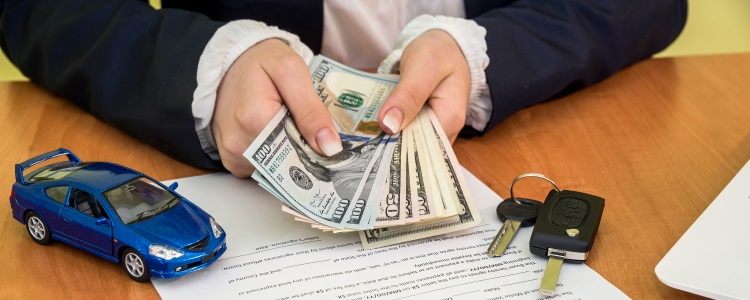If your credit score is below 660 or you want a chance for a lower interest rate, then bringing a cosigner along could give you an edge. Here’s how cosigners can help, what their rights are, and some other auto lending options to consider if you have poor credit.
How to Get a Cosigner
A cosigner is somebody who signs a loan along with a primary borrower. This arrangement is usually the result of a lender asking for one when the primary borrower can't get approved for a loan on their own. There are many reasons for this, including when the primary borrower has bad credit, no credit history, or doesn't meet the lender's income requirements.
Most commonly, a cosigner is someone that wants to help the borrower get approved. If a cosigner is needed to boost credit, they need to have good or great credit and, if they’re not married, both the cosigner and primary borrower have to individually qualify for the loan. If you need enhanced income to qualify for a loan a co-signer won't be able to help, as this is the role of a co-borrower, which is different than a cosigner. Co-borrowers need to be the spouse of the borrower, which is the only way incomes can be combined to meet a lender's requirement.
Pretty much anyone can be your cosigner for a car loan. Your cousin, friend, co-worker, roommate, parent – your relationship with the person doesn’t matter. The only person that lenders don’t accept as a cosigner is your spouse.
For your cosigner to qualify, they typically must:
- Have a good credit score, usually 660 or higher
- Meet the lender's income requirements
- Meet the debt-to-income requirements
 For your cosigner to be of any help in your pursuit of an auto loan, they must have a decent credit score, enough income to repay the loan if required, and enough room in their budget to do so.
For your cosigner to be of any help in your pursuit of an auto loan, they must have a decent credit score, enough income to repay the loan if required, and enough room in their budget to do so.
Once you find a cosigner with a good credit score and enough available income, you can take them with you to apply for an auto loan! Both of your credit reports are pulled, you both need documents to prove you’re able to repay the loan (such as check stubs), and proof of a working phone, proof of residency, and a driver’s license.
To get the deal done, all a cosigner needs to do is sign their name on the dotted line along with the primary borrower. But make no mistake, the role of the cosigner goes far beyond that of a simple character reference.
What It Means To Cosign For a Car Loan
If you find a cosigner and you’re able to qualify for an auto loan, then it’s important to know and understand your rights and responsibilities as a primary borrower and inform the cosigner of theirs.
Cosigners add security to the auto loan since they agree to repay the loan if you become unable to. Lenders can be wary of approving borrowers with a low credit score or tarnished credit history. A cosigner can increase your approval odds because they act as a backup payer.
While you have a backup payer on the car loan, you’re the primary borrower. This means that you have full rights to the vehicle and it’s your responsibility to make the car payments each month. Your cosigner isn’t there to help you make the monthly payments – they’re the last resort. If you head down the path of default, or lose your income and can’t make payments, that’s when the cosigner is called into action in most cases.
Since you’re the primary borrower, you get the last say in what happens to the vehicle and its loan. Your cosigner can’t take your car, sell it, or end the loan because they have no authority to do so. You can end the loan contract by paying off the lender without having to consult the cosigner or ask their permission (although it may be polite to let them know if you do!).
By signing their name to the loan, the cosigner does become legally obligated to it. This means they're bound to repay the loan in the event the primary borrower doesn't, giving the lender a guarantee the loan will be paid back. For this reason, lenders are more willing to approve borrowers with poor credit who have a cosigner with good credit.
 It's important that the cosigner (and the primary borrower) understand the very real risks of cosigning for a car loan:
It's important that the cosigner (and the primary borrower) understand the very real risks of cosigning for a car loan:
- Responsible for paying back the loan: The cosigner may have to make any missed payments or pay the remainder of the loan if the primary borrower defaults (including late fees or other costs). The lender can also sue and take collections action against the cosigner, including wage or bank account garnishments.
- The loan is part of their Credit: Despite not having any ownership right to the vehicle, the loan appears on the credit reports of the cosigner as if it were their own. This means their credit score can be impacted for better or for worse. If things go south, late payments, delinquency, judgments, collections, and more can drop the cosigner’s credit score and appear in their credit reports. This can also impact a cosigner's ability to obtain credit on their own, as this debt will be factored into future credit decisions while the loan is open.
- Hard to get removed: Lenders typically don't allow a cosigner to be removed from an auto loan, so they're usually in it for the long haul. Typically, the only way to get a cosigner off your loan is if you can refinance the loan on your own.
For these reasons, cosigning for a car loan isn't an arrangement to be taken lightly. The cosigner takes on all of the loan's responsibilities without getting ownership rights to the vehicle. However, it's a personal decision, and helping the primary borrower get approved may be worth the risk in the cosigner's eyes.
Understand the Credit Score Impact
Both you and the cosigner are impacted by the payment history on the auto loan. If you make all the payments on time, then both of your credit scores can see improvement during the life of the loan. However, the opposite is true as well. If you miss a few payments or are consistently late, both of your credit scores could see a decline.
Finding a Bad Credit Auto Lender
Even if you do have a cosigner to lend you a good credit score, some lenders may still be wary if your credit history is tarnished.
Credit unions and subprime lenders tend to be the most willing when it comes to lending to credit-challenged consumers. Credit unions are member-owned, and may be willing to work with less-than-perfect credit if you’ve been a long-standing member and maintained a good account history with them. However, borrowers with serious credit challenges such as bankruptcy, repossession, or multiple negative marks may need to seek out subprime financing.
Subprime lenders are signed up with special finance dealerships. They often assist borrowers in tough credit situations, and may not even require you to have a cosigner if they can meet the requirements alone. Bad credit isn’t a stranger to these lenders, and not everyone has the luxury of a cosigner, so subprime auto loans are a great option for bad credit borrowers in need of vehicle financing.
Cosigner or not, we want to help you find the car-buying resources you’re looking for. Here at Auto Credit Express, we’ve created a nationwide network of special finance dealerships that are equipped to handle many unique credit situations. Once you complete our free auto loan request form, we’ll look for a dealer in your local area. Get started now!


















